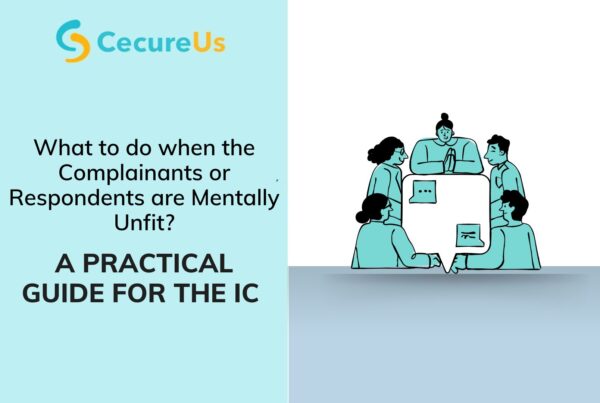Workplace PoSH compliance – A brief introduction
Women are subjected to harassment of various forms, irrespective of their class in society. Whether at the workplace or outside, these harassments can cause emotional trauma to women. The Prevention Of Sexual Harassment/PoSH law articulates a mechanism for fairly addressing harassment complaints of women at the workplace to bring justice to the victim. The PoSH rules guarantee a fair and thorough examination of the complaints submitted by women and a transparent unbiased enquiry system to ensure that there are no malicious complaints at the workplace for women to remain harassment-free.
The PoSH act demands organizations to conduct periodic PoSH training. These aim at attaining sexual harassment-free workplaces by educating the employees about the various aspects of sexual harassment and the importance of a harassment-free workplace for women. Employees are trained to comprehend the impact and consequences of sexual harassment of women in the workplace through these mandatory PoSH programs.
Though the act is called The Sexual Harassment of Women at Workplace (Prevention, Prohibition and Redressal) Act, 2013, this does not mean that the act favours only women when related to workplace harassment complaints, and there would be a dictatorial approach toward the other party. The POSH rules guarantee that, during the proceedings, the other party will also be assured a right of equal representation as that of women and free trial for justice. In this article, we will further discuss this concept and its relation to principles of natural justice.
PRINCIPLES OF NATURAL JUSTICE AND THE POSH ACT
To understand the relationship between principles of natural justice and the PoSH act, we need to understand the principles of natural justice. The principles of natural justice talk about the fundamentals of a fair trial. This includes the primary elements of natural justice like adequate notice period, fair hearing, and unbiased judgment. Also, natural justice is not limited to ‘fairness;’ it also implies reasonability, equity, and equality.
Two principles are prime in this context:
- Nemo judex in causa sua – This Latin maxim states that no one should be made the judge of their cause. Justice should be achieved in an unbiased manner. Therefore the adjudicating authority must have a neutral approach to harassment complaints of women.
- Audi Alteram Partem – This legal maxim proclaims that during the examination of a PoSH complaint, no party (women or men) should remain unheard while achieving justice.
The premise of the POSH Act is based on the principles of Natural Justice and ensures a harassment-free workplace for women.
- The Sexual Harassment of Women at Workplace (Prevention, Prohibition and Redressal) Act, 2013, Rule 7(4)categorically states that the complaints committee shall abide by the principles of natural justice in the procedure of inquiry of PoSH complaints, rendering an unbiased examination and enquiry of complaints and similarly in the process of attaining justice.
- Section 11 of the PoSH Act states that, during an enquiry, both parties must be given an equal opportunity of being heard.
- In Section 14, there is a provision under which the respondent can file a case if he faced any malicious prosecution.
There is a Case Law that affirms that in the PoSH Act, principles of natural justice and unbiased compliant examination procedures are followed and also that the PoSH Act and its institutes like the Internal Complaints Committee are committed to providing justice impartially.
CASE LAW – AVINASH MISHRA vs. UNION OF INDIA
In this case, the petitioner had filed a suit challenging the proceedings of the internal complaint committee. Referring to the IC, he said that he was not allowed to cross-question the witnesses, and he was denied the right to a fair trial. He also stated that his explanations for the allegations were not considered. Additionally, he claimed that the witnesses were all examined by the IC Committee in his absence and that he was not given copies of the witness statements, and, most importantly, he was denied the right to cross-examine them, and there was no justice. He contended that the internal complaint committee’s proceedings were not abiding by the principles of natural justice. Such proceedings were a clear violation of article 14 of the PoSH law of the Indian Constitution.
Undoubtedly, sexual harassment of women in the workplace is prone to severe consequences, and if the allegations are proven correct, the culprit shall not be spared. But the approach adopted to reach judgment should not be biased at all.
It is also vital to know that the respondents did not deny that the petitioner was not allowed to cross-examine the witnesses presented before the complaints committee. Consequently, the reports made by the complaints committee based on their examination of the PoSH complaint were set aside, and the complaints committee was given directions regarding the inquiry.
The directions were as follows:
- The respondent must present all the copies of every relevant material which had not been provided to the petitioner earlier.
- The inquiry would now begin from the stage of cross-examination. The petitioner would now be entitled to cross-examine the witnesses.
- The cross-examination would be conducted by the female defence assistant of the petitioner’s choice or a male defence assistant. Even if he does not avail of the services of any such defence assistant, he may present a questionnaire to cross-examine the complainant and the witnesses.
CONCLUSION
The PoSH Act was instituted to ensure that the perpetrators of sexual harassment must be punished through unbiased examination and trial and that justice must be served to achieve a 100 percent harassment-free workplace for women. But in the pursuance of justice, one must not be guided with any prejudice. To prevent such actions, the PoSH Act has encoded several sections which ensure that both parties will get a fair trial by adhering to the PoSH rules.
ABOUT THE AUTHOR
Hemansh Tandon is a fourth-year law student from Indraprastha University. He is an avid reader and has a keen interest in writing prose and verses.
For more information on Prevention of Sexual Harassment(POSH), EAP (Employee Assistance Programs), D&I (Diversity and Inclusion) offerings by CecureUs , please contact connect@cecureus.com or call us at +91-7200500221




